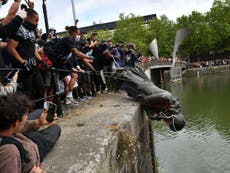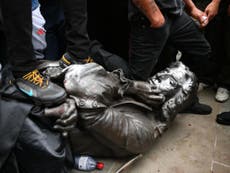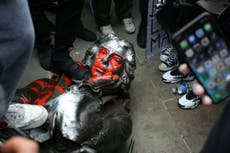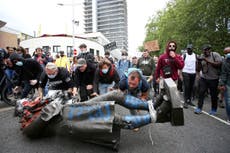Black lives only seem to matter to Boris Johnson when they’re censored
The desperation to shift the conversation away from structural racism is yet another thing in the movement's way

We live today with our finger always on the trigger. There has never been an easier time to be angry. The act of registering one’s rage with the world does not even require both hands. Condemnation no longer even slows the passage of the breakfast spoon to the gob.
But it does leave behind a permanent record of what has fired the impulse, and what hasn’t. There can be no secrets kept of what it is we truly care about.
It’s been two and a half years since absolutely nothing was done about systemic racial prejudice in the British criminal justice system, as laid bare in the Lammy review. It’s been two weeks since George Floyd died in a Minnesota gutter with a policeman’s knee pressed to his neck for nine minutes.
But woah woah woah, what’s this? They’ve pulled down a statue? There’s a bit of graffiti on the cenotaph? Pass me my iPhone. I’m going in.
It’s the moment at which the silence is broken that reveals all. Of course, no one should be surprised that Nigel Farage, Tommy Robinson and all the usual creeping things that riot in such moments have hastened to their toxic repast.
For Farage, the Black Lives Matter movement is “a new form of the Taliban”. Apparently what is required, in Mr Breaking Point’s view, is “moral leadership”.
At least these people have the sense to dispense with the “but”. On Sunday, a curious gang of vigilantes in face masks gathered around a war memorial on Plymouth Hoe to charitably announce that they have “no issue with any BLM protest ... but if you decide to attack war memorials today, you’ll be picking the wrong one.”
Just pause and enjoy the words “no issue” there. If you want to protest against systemic racism then go right ahead. We’ve got “no issue” at all, but do it on our terms please, or we’ll beat the shit out of you.
The origin of the old phrase “everything before the but is bollocks” appears to be unknown, though Benjen Stark did offer a more sanitised version of it to Tyrion Lannister: “My brother once told me that nothing someone says before the word ‘but’ really counts.”
Arguably it was generous for the prime minister to break his silence late last night to offer the words: “People have a right to protest peacefully and while observing social distancing but they have no right to attack the police.”
Words so trite and so obvious that all that is achieved by their having been said is to reveal what has long been known.
You don’t need to be the world’s biggest Game of Thrones fan, or even to have read the prime minister’s casual and consistent racism spread across decades of journalistic output to know on which side of the Plymouth Hoe war memorial divide his natural sensibilities lie.
He too has “no issue” with people protesting against systemic racism. Just don’t expect him to do a thing about it.
As the Black Lives Matter movement has spread around the world, its form has shifted to meet the specific prejudices in its way. Black British people are not killed by police officers in their hundreds and thousands each year (I would love to give an exact number, but the US government doesn’t merely not publish it, it doesn’t even know it).
Black British people on the streets at the weekend were protesting against, to take just a small selection, their being twice as likely to die in police custody as white people, though not a single charge of any kind has been brought in decades. Stop and search, Windrush, Grenfell, the disproportionate deaths of black people from Covid-19... all these things add up to structural racism.
But so does the desperate desire to shift the conversation elsewhere. Down comes a statue and up goes the volume. The systemic unfairness faced by black people is suddenly worth talking about only when the subject can be changed to wearisome debates about “historical revisionism” and the acceptable limits of civil disobedience.
(Though, on that last point, it is arguably worth pausing to point out that the Edward Colston statue, which is now to be found at the bottom of Bristol harbour, was erected in 1895, 170 years after the man’s death, and 60 years after the abolition of slavery. Historical revisionism is certainly not a recent phenomenon.)
For what it’s worth, I don’t claim innocence in all this, by the way. I write a daily politics column and am an embarrassingly prolific tweeter, yet I believe this is the first time in the past two weeks that anything concerning Black Lives Matter has exited my fingers in any form.
By my own argument, I would have to concede that I am less angered by the systemic racially motivated killing of black people than I am by Farage’s terrible opinions.
If I were to offer a reason why, perhaps I might argue that I am reluctant to seek to ally my purely moral anger with the real-life suffering of others. No one’s knee is on my neck, after all.
But it is clearer now than ever before that that argument simply won’t do. The pictures on TV screens over the weekend show that the movement transcended race long ago.
Those that think what matters about Black Lives Matter is where the line must stand on the right to peaceful protest are just another thing standing in its way.
The question is on which side of the “but” you stand. No one will be surprised that our prime minister is on the wrong one. He will have no grounds for complaint when he finds himself told as much, over and over again, for as long as it takes.







Join our commenting forum
Join thought-provoking conversations, follow other Independent readers and see their replies